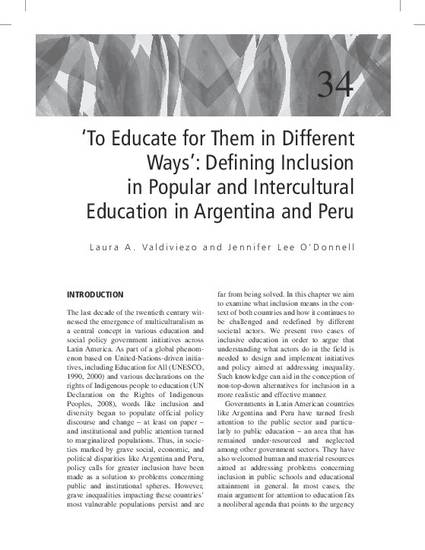
Contribution to Book
“To Educate for Them in Different Ways;” Defining Inclusion in Popular and Intercultural Education in Argentina and Peru
SAGE Handbook on Inclusion and Diversity in Education
(2019)
Abstract
The last decade of the twentieth century gave place to the emergence of multiculturalism as a central concept in various education and social policy government initiatives across Latin America. Part of a global phenomenon based on United Nations driven-initiatives, words like inclusion and diversity would begin to populate official policy discourse and change – at least on paper – language that had appeared traditionally as neutral in societies marked by grave social, economic, and political disparities like Argentina and Peru.
Government sponsored education programs like intercultural bilingual education, IBE in Peru, or partnerships forged between Ministry of Educations and grassroots education movements in Argentina, would aim at the inclusion of diverse populations and ensure their access to education historically dedicated to socialize under-served communities into the mainstream society. Comparisons between policy and practice in these contexts have revealed the co-existence of discourses between government and education actors in the field, where in many cases, government officials and educators have shown contradictory conceptualizations of inclusion in education spaces.
The analysis of policy discourse and program implementation in IBE in Peru, for example, revealed that government officials would maintain top-down exclusionary views of IBE policy. Government views continued to resemble ideas of the school house as a space for mainstreaming diverse children; these views often denied the Indigenous cultural and linguistic practices inside the classroom. By contrast teachers welcomed such practices in their daily lessons. Analysis revealed the contradictions between teachings in the field where sometimes innovative education practices that included diverse linguistic and cultural practices co-existed with those that emphasized rote memorization and dictation in the dominant language.
In the non-formal setting, recent studies in Argentinean popular education initiatives show internal contradictions emerge once these social change-oriented groups partnered with government entities. Analysis showed that though government partnership provided popular schools’ financial benefits, the repercussions of the state’s presence in grassroots spaces weakened the relationship between educators, activists, and their schools. The line of distinction between a social organization and one that allied with the government became a point of contention which the collectives had not yet figured how to live with in ways that could advance their vision further. In essence, when federal funding was a factor, it changed the dynamics of the social organization and the relationships within it, excluding some teachers while leaving others dissatisfied and without recourse.
The present chapter will offer a comparative analysis of these cases from the range of sometimes contradictory understandings of inclusion and diversity of educators in the field. From concepts to practice, the authors aim at broadening the definition and complexity of education that embraces diversity and inclusion in Argentinean and Peruvian multicultural programs. Ethnographic data will be offered to depict both the epistemologies and practice in these education programs as well as the dilemmas educators and participants face. Beyond detailed descriptions, the present chapter will aim at emphasizing how such contradictions and dilemmas can become transformative if used to amplify/innovate both (theoretical) analysis and policy design on diversity and inclusion in education.
Keywords
- Argentina,
- Peru,
- Popular Education,
- Indigenous education,
- bilingual education,
- educatin policy
Disciplines
Publication Date
Fall 2019
Editor
M. Schuelka, C. Johnstone, G. Thomas & A. Artiles
Publisher
SAGE
ISBN
978-1-5264-3555-2
Citation Information
Laura A. Valdiviezo and Jennifer Lee O'Donnell. "“To Educate for Them in Different Ways;” Defining Inclusion in Popular and Intercultural Education in Argentina and Peru" SAGE Handbook on Inclusion and Diversity in Education (2019) p. 468 Available at: http://works.bepress.com/laura_valdiviezo/22/
